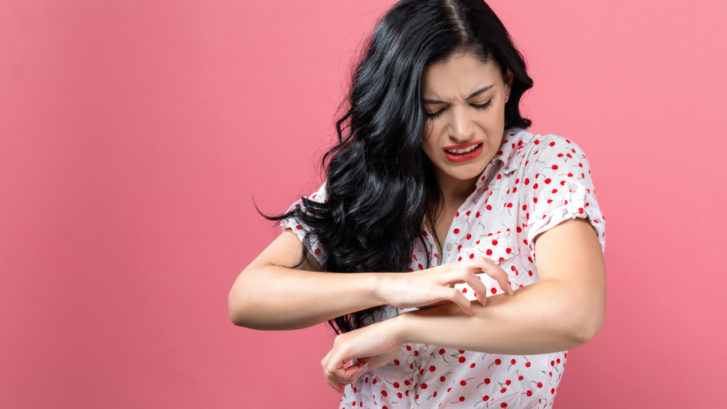Questions and Answers About Eczema
Our concierge family doctors at MD 2.0 in Jupiter encounter many skin conditions in the course of treating our patients, but perhaps none is as frustrating as the common ailment known as eczema. Because this condition affects more than 30 million Americans, we’d like to explore the symptoms and triggers of this condition and explain how to treat it.
What is eczema?
Eczema (pronounced “egg-ze-muh”) is a term for a set of chronic skin conditions characterized by red, irritated, itchy skin, normally accompanied by a rash. The name is derived from a Greek word meaning “to boil over,” which perfectly describes the inflamed patches which accompany outbreaks.
According to the National Eczema Association (NEA), over 30 million Americans have eczema, which results in symptoms ranging from mild to moderate to severe. Outbreaks can appear anywhere on the skin, and a person can have more than one type at the same time. Eczema is not contagious.
Although usually beginning before age five, it can occur at any age. It can disappear for months and even years, then flare up again, although children who experience it normally outgrow it by their teens. Adults can develop eczema, even if they never had it as children.
There are several types of eczema:
• atopic dermatitis (the most common)
• contact (also known as “allergic”) dermatitis
• dyshidrotic (blisters on palms and/or feet) eczema
• nummular (coin shaped) eczema
• seborrheic (scalp) dermatitis
• stasis (lower legs) dermatitis
Those who develop atopic or contact dermatitis are also more likely to have asthma, hay fever, and/or food allergies. In addition, research suggests that people with eczema have higher rates of depression and anxiety.
What are the symptoms?
The symptoms of eczema are different for everyone. The most common symptoms of eczema include:
• dry, sensitive skin
• itching, usually severe
• thickened, cracked, leathery, and/or scaly skin
• oozing or crusting
• red or brownish-gray patches
• raw or swollen skin resulting from scratching
Sufferers may experience some or all of these symptoms. In some cases, the itch that accompanies outbreaks becomes so severe that scratching leads to infection. It can also interfere with daily activities and interrupt sleep.
What causes it?
No one knows exactly what causes eczema, although a combination of genetic predisposition combined with an environmental trigger (or triggers) are the most likely suspects.
According to the NEA, “People with eczema tend to have an over-reactive immune system that, when triggered by a substance outside or inside the body, responds by producing inflammation. It is inflammation that causes the red, itchy and painful symptoms common to most types of eczema.”
Gene research also shows that some people who have eczema also have a mutation of the gene that controls production of a protein that creates a protective barrier on the skin’s top layer. Without this protein, skin becomes drier and bacteria and viruses have easier access to lower layers of the skin.
Some common eczema triggers can include:
• contact with rough or coarse material like wool or polyester
• metals, especially nickel
• dry skin
• fragrances
• exposure to some household products like soap, shampoo, or detergents
• hot or cold weather
• upper respiratory infections or colds
• contact with animal dander, pollen, mold, or dust mites
• stress
Stress can be both a cause and a result of eczema outbreaks.
How is it treated?
While there is currently no cure for eczema, mild and intermittent outbreaks can usually be treated at home with lukewarm baths containing solutions of salt, vinegar, bleach, or oatmeal, and moisturizing immediately afterward. Some over-the-counter (OTC) products used to moisturize skin, relieve rashes, redness, and inflammation, or gentle cleansers may help.
If the condition is so uncomfortable that it is affecting your sleep or daily activities, has become infected, or continues despite home remedies, we can help.
In the past, we would prescribe topical steroids to treat eczema, but these often come with significant side effects, including thinning of the skin and broken capillaries, when used for extended periods of time.
These days new classes of drugs allow for more effective treatment of the condition with fewer side effects. This includes the so-called “biologics” and immunomodulators. The former works by stopping the inflammation that triggers outbreaks and the latter by inducing anti-inflammatory effects on the skin.
Photo (i.e., ultraviolet light) therapy has also shown promise in reducing symptoms, while antihistamines can reduce severe itching.
Many types of skin conditions are grouped under the general diagnosis of eczema, each of which have different symptoms, triggers, and treatments. So it’s important to know which type you have. Please see us if you have any of the symptoms described above, or if the condition persists or worsens.

